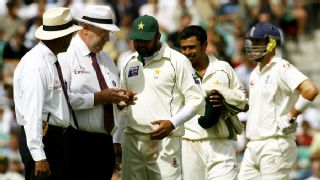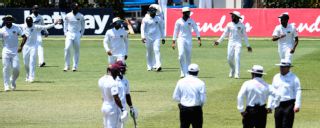|
As Dinesh Chandimal becomes the latest cricketer to be punished for ball tampering, we take a look at every ball-tampering offence since 2000 that led to an ICC charge. July 2000 Sri Lanka vs Pakistan, Colombo Pakistan fast bowler Waqar Younis became the first player in cricket history to be suspended for ball-tampering. Waqar was caught on camera attempting to change the condition of the ball, and was docked 50% of his match fee and banned for one game. Team-mate Azhar Mahmood was also charged with a similar offence and fined 30% of his match fee. Pakistan did not contest the charges. Sanction: Waqar Younis banned for one game, fined 50% of his match fee. Azhar Mahmood, fined 30% of his match fee. November 2001 South Africa vs India, Port Elizabeth In the second Test between India and South Africa, Sachin Tendulkar was picked up on television cameras allegedly scuffing the seam of the ball. Match referee Mike Denness banned him for the third Test. It caused an uproar in India, who were aggrieved at the number of players punished by Denness during the match, with Virender Sehwag also being banned for one Test. The BCCI threatened to call off the tour, ultimately leading to the ICC declaring the third Test match of the series as unofficial, and later reversing the ban on Tendulkar, and dropping the ball-tampering charges against him. Sanction: Tendulkar banned for one Test, later reversed. November 2002 Zimbabwe vs Pakistan, Harare Pakistan fast bowler Shoaib Akhtar was found guilty of ball-tampering during the first Test against Zimbabwe in Harare. Match referee Clive Lloyd levelled the charge, saying Akhtar had altered the condition of the ball illegally. Sanction: Official warning. May 2003 Pakistan vs New Zealand, Dambulla For the second time in six months, Shoaib Akhtar was hauled up in front of the match referee, accused of ball-tampering. He pleaded not guilty, but was found guilty by the match referee, a verdict Pakistan did not appeal. Sanction: Banned for two ODIs, fined 75% of his match fee. January 2004 India vs Zimbabwe, Brisbane Indian batsman Rahul Dravid was reported by third umpire Peter Parker for alleged ball tampering in an ODI of a tri-series between Zimbabwe, Australia and India. He was seen to have rubbed a cough lozenge on the shiny side of the ball. Match referee Clive Lloyd charged him, and he was found guilty. Sanction: Fined 50% of his match fee. August 2006 England vs Pakistan, The Oval The biggest ball-tampering scandal of all took place in England, leading to the first - and to date, only - forfeiture of a Test match. In the afternoon session on day four of the Test, the fourth and final one of the series, umpires Darrell Hair and Billy Doctrove deemed Pakistan to have tampered the ball, awarded England five penalty runs, and changed the ball. Play continued as normal until tea. After that, the Pakistan team didn't come out onto the field of play on time. They were registering a protest; however, in the meantime, the umpires awarded the Test to England according to the laws. The ramifications were widespread; Inzamam was eventually cleared of charges of ball-tampering, but sanctioned for bringing the game into disrepute by refusing to take the field. He was banned for four ODIs. After Pakistan were cleared of ball-tampering the result of that Test was changed to a draw in July 2008, but that was reversed by the ICC in February 2009, with England awarded the match again. Sanction: Cleared of ball-tampering charges, banned for four ODIs for bringing the game into disrepute.  January 2010 Australia vs Pakistan, Perth In what has possibly been the least subtle attempt to change the condition of the ball to date, Shahid Afridi was caught on TV biting down on the ball with his teeth, apparently to change the seam of the ball. The ball was replaced by the umpires. Sanction: Banned for two T20Is. October 2013 South Africa vs Pakistan, Dubai On the third day of the second Test against Pakistan, Faf du Plessis was seen scuffing one side of the ball on the zip of his trousers. It was spotted by the onfield umpires, who awarded Pakistan five penalty runs and changed the ball. Du Plessis was fined half his match fee for the Test, with South Africa deciding not to challenge the ruling despite team manager Mohammed Moosajee protesting that it "was harsh". Sanction: Fined of his 50% match fee. July 2014 South Africa vs Sri Lanka, Galle Hot on the heels of the du Plessis fine against Pakistan nine months ago, South African bowler Vernon Philander was charged with ball tampering. He was deemed to have scratched the ball with his fingers, thus breaching clause 42.1 of the laws. Sanction: Fined 75% of his match fee. November 2016 Australia vs South Africa, Hobart For the third time in five years, a South African player was charged with ball tampering. It was Faf du Plessis again, whose television footage seemed to show him applying saliva onto the ball that had residue of a mint on it. The on-field umpires had not charged him, but following the release of the footage, he was found guilty. Sanction: Fined 100% of his match fee. November 2017 India vs Sri Lanka, Nagpur Sri Lankan fast bowler Dusan Shanaka was charged by match officials for changing the condition of the ball. He was seen by on-field umpires Joel Wilson and Richard Kettleborough picking at the seam of the ball several times, and Shanaka admitted to the offence. Sanction: Three demerit points, fined 75% of his match fee.  March 2018
March 2018
South Africa vs Australia, Cape Town Video footage showed Australia batsman Cameron Bancroft appearing to rough up one side of the ball using sandpaper. After having been made aware that he had been caught on camera, he stuffed the sandpaper down his pants, an act also caught on TV. In extraordinary circumstances, captain Steven Smith appeared with Bancroft at the press conference at the end of the day, admitting a "leadership group" within the team had pre-planned the tampering. The outrage across the cricketing world was enormous, and though the ICC charge only saw Smith suspended for one Test and Bancroft docked 75% of his match fee, Cricket Australia conducted an independent investigation. The sanctions were far harsher, with David Warner and Smith banned for a year each, and Bancroft for nine months. Sanctions: Cameron Bancroft fined 75% of his match fee by ICC, banned for 9 months by Cricket Australia; Steven Smith fined 100% of his match fee and suspended for one Test by ICC, banned for a year by Cricket Australia; David Warner banned for a year by Cricket Australia. June 2018 West Indies vs Sri Lanka, St Lucia Dinesh Chandimal was accused of altering the condition of the ball using saliva that contained residue of mints he had in his mouth. Umpires Aleem Dar and Ian Gould added five penalty runs to West Indies' score on the morning of the third day of play. Sri Lanka were extremely aggrieved, refusing to come out to play on the third day, delaying the start by almost two hours. Sanction: Banned for one Test.
|

